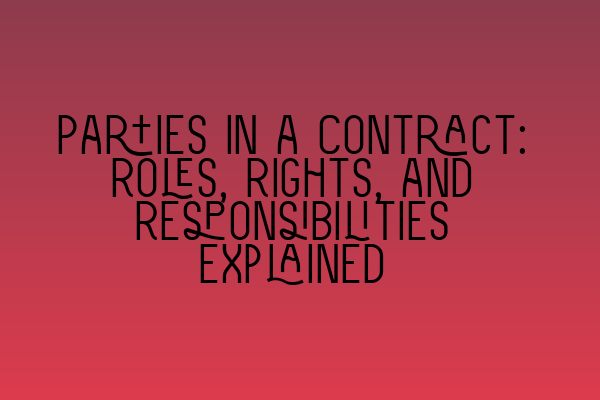Parties in a Contract: Roles, Rights, and Responsibilities Explained
In the realm of contract law, one of the fundamental concepts is the involvement of parties in a legal agreement. Parties play crucial roles in contracts, with each having specific rights and responsibilities. Whether you are about to enter into a contract or just seeking a better understanding of contractual obligations, this blog post will provide you with a comprehensive overview of the roles, rights, and responsibilities of parties in a contract.
1. Introduction to Contract Parties
A contract typically involves two or more parties who come together to form a legally binding agreement. These parties could be individuals, businesses, organizations, or even government entities. Each party involved has distinct rights and responsibilities that shape the dynamics of the contract.
2. Primary Roles of Contract Parties
– Promisor: The promisor is the party that promises to perform a specific action or provide a particular service as outlined in the contract. They are obligated to fulfill their promises, and their performance is typically legally enforceable.
– Promisee: The promisee is the party to whom the promise is made. They are the recipient of the performance outlined in the contract and have the right to enforce the promises made by the promisor.
– Beneficiary: In some contracts, there may be a third party known as the beneficiary. The beneficiary benefits from the contract but is not directly involved as a promisor or promisee. They may have specific rights or benefits granted to them under the contract.
3. Rights and Responsibilities of Contract Parties
– Performance: One of the primary responsibilities of each party is to perform their obligations as defined by the contract. This involves delivering products, providing services, or fulfilling any other agreed-upon action within the specified timeframe.
– Consideration: Parties have the right to receive consideration, which refers to the value exchanged between them. Consideration can be in the form of payment, goods, services, property, or anything else of value as agreed upon in the contract.
– Representation: Parties have the responsibility to provide accurate and truthful information during the negotiation and formation of the contract. Misrepresentation or fraudulent statements may invalidate the contract or lead to legal consequences.
– Confidentiality and Non-Disclosure: Depending on the nature of the contract, parties may have a duty to maintain the confidentiality of certain information disclosed during the contract’s performance or negotiation. Breaching confidentiality obligations can lead to legal action and damage the breaching party’s reputation.
– Termination and Remedies: Parties have rights and responsibilities regarding the termination of the contract. They may include provisions for the termination of the contract due to non-performance or breach. Additionally, parties may have rights to seek remedies such as damages, specific performance, or injunctive relief in case of contract violations.
– Dispute Resolution: Parties are responsible for resolving disputes that may arise during the performance of the contract. This could involve negotiation, mediation, or arbitration, depending on the agreed-upon method in the contract.
4. Importance of Clear Contractual Clauses
To avoid disputes and ensure smooth performance, it is essential to have clear and comprehensive contractual clauses. These clauses should outline the duties, rights, and responsibilities of each party in detail. Clear contractual language helps parties understand their obligations, reduces misunderstandings, and provides a reference point in case of conflicts.
5. Conclusion
Understanding the roles, rights, and responsibilities of parties in a contract is crucial for entering into agreements with confidence. Each party plays a vital role in the success of a contract, and clarity regarding obligations ensures a smooth contractual relationship. By clearly defining the rights and responsibilities of each party, the chances of contract disputes and legal ramifications can be minimized, fostering stronger business relationships.
At SQE Contract Law, we have a team of experienced solicitors who can guide you through the intricacies of contract law. Contact us today to ensure that your contracts are comprehensive, legally sound, and protective of your rights and interests.
